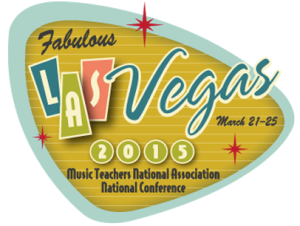 Pedagogy Saturday is usually my favorite day of the MTNA conference and this year was no different. It is always challenging to choose which sessions to attend. I started out attending the Advanced Piano/Teaching Artistry track, and then I switched over to the Young Professionals track after lunch. My own session, “Harnessing the Power of the Internet: Blogging and Social Media for the Musican,” took place during the Young Professionals track at 2:15pm.
Pedagogy Saturday is usually my favorite day of the MTNA conference and this year was no different. It is always challenging to choose which sessions to attend. I started out attending the Advanced Piano/Teaching Artistry track, and then I switched over to the Young Professionals track after lunch. My own session, “Harnessing the Power of the Internet: Blogging and Social Media for the Musican,” took place during the Young Professionals track at 2:15pm.
8:00–9:00am: Teaching Demonstration No. 1: Master Class With Alan Chow
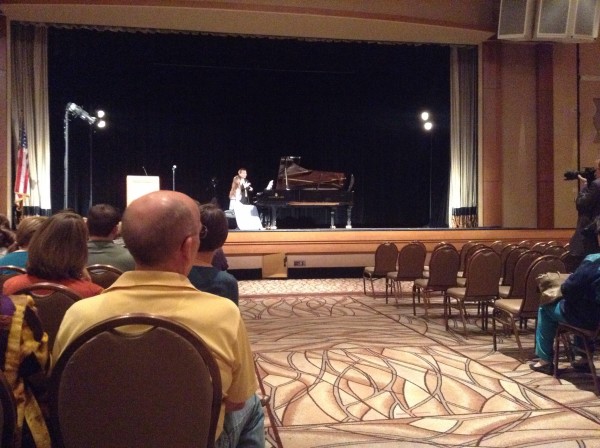
The student performed Schumann’s Papillons quite musically and beautifully. Overall in his teaching demonstration, Alan focused on being more true to Schumann’s markings. For example, he suggested that the intro could be more rhythmically accurate, to capture the feeling of the dance. In addition, many of Schumann’s phrases are marked with a crescendo to the end. We must be true to those markings. We can take time when warranted, but perhaps not other times.
Alan’s teaching was full of wonderfully clear directives backed by justifications based on the score or the context of the piece. It was a pleasure to watch his teaching demonstration.
9:15–10am: The Russian School: Building Technique For Budding Virtuosi, by Marina Lomazov
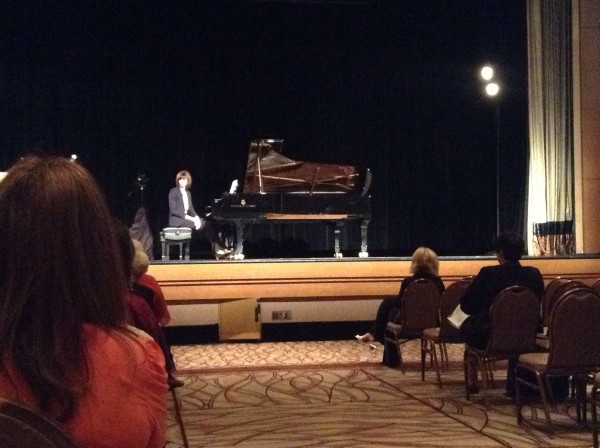
Marina began by communicating that she would like her presentation to be more of a discussion and conversation, versus a presentation, about the Russian school.
She began by aesthetically defining the Russian school. It refers to a style of playing or pedagogy. It dates back to mid 1850s in the St. Petersburg and Moscow Conservatories by Anton and Nikolai Rubinstein, respectively. This was a time of Nationalism and the starting of a tradition. Theodore Lischititsky was another important figure. Later pedagogues contributed greatly to this tradition.
Marina stated that she feels the Russian tradition begins from the very first lesson and is strongly rooted in the beginner student’s training, focused on imagery, aesthetics, expression, which carries through the student’s training as they become advance and develop individuality as a performer. Those first lessons in the Russian tradition begin not with reading, but by experiencing and playing with sound and awakening the child’s imagination. The focus is on hearing the sound and then feeling something in reaction to that sound. And forming a link between the child’s imagination to sounds, gestures, and movements.
The first lesson begins with the first gesture: dropping firming and boldly into the keys. The goal is freedom of gesture. Grandeur (or whatever expression) should be expressed through the gesture as well as through the sound. Make the meaning of the music clear. Through imagery, we can answer questions about technique.
Marina gave one example of the opening chords of Tchaikovsky’s famous piano concerto. In her gestures as well as her sound, she showed that the first chord is the foundation, the second chord is the support, and the third chord is the ringing bell that lifts you back to the first chord.
Marina concluded her presentation by answering some questions from the audience.
10:30–11:30am: Repertoire Takeaways In Classical Teaching Literature—Lutowslawski To Beethoven, by Jane Magrath, NCTM
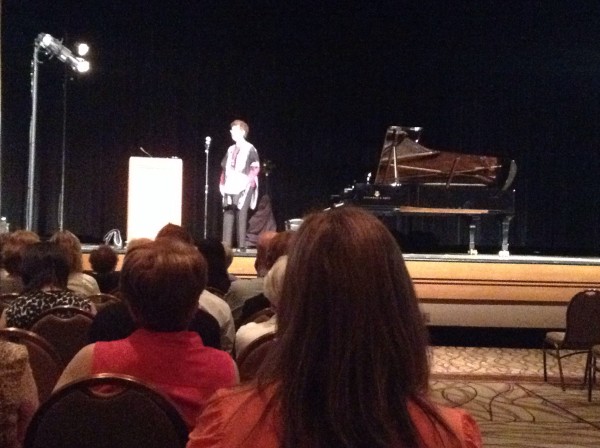
In her session, Jane led us through some wonderful examples of 20th century repertoire for students. These are the pieces she talked about:
- Ligeti: Two Capriccios — Contemporary harmonies, rhythmic.
- Takács: Sounds and Colours, Op. 95. Early elementary / early intermediate level. Huge variety of musical styles, many pieces requiring extended techniques. He is a Hungarian composer who has written a huge amount of pedagogical student level pieces.
- Kurtág: Játékok (Games) in 8 volumes. Inspired by children playing, children who still consider the piano a toy. They are for experimenting – not for leaning to play the piano. Many use graphic notation. Designed to be a supplement.
- Liebermann: Album for the Young. Fit the hand very well.
- Albright: The Machine Age.
- Bernstein, Seymour: Birds, Set 1. Impressionistic pieces. The Hummingbird is particularly nice, and only Level 3.
- Brubeck, Dave: Nocturnes. Small, lyrical pieces appropriate for adults or children. Light jazz influence.
- Louie, Alexina: Star Light, Star Bright. Intermediate. Uses a range of Canadian composer.
- Lutoslawski: Folk Melodies for Piano. Charming pieces.
1:00–2:00: Master Classing: The “How-to” And “What-to” Teach In Public, Michael Benson, NCTM
After a young student performed Mendelssohn Op. 30 No. 6, Michael asked the audience for to volunteer three specific musical concepts/ideas that the student performed or communicated beautifully. It is important to provide the student with clear positive feedback.
Michael used the phrasing: “I’m going to ask you to do something for me…” He also taught using many questions, for example: “What do you see here?” “What does that mean?” “Can you play it again, this time with…?” “That was lovely. What did you hear that was different that time?”
Michael led the student to create a greater forte sound at the climax of the piece, and also to give a more boat rocking feel to the LH accompaniment (he coached a slightly faster tempo, counting aloud for her). They discussed the boat song being a solo song at first (lonely) and then becoming a duet (the people are excited to see each other). “Do you like this tempo better, or the previous tempo?” Imagery is helpful. So is phrasing things as a team; or example: “Let’s try…”
When starting, begin by checking that if student has any questions. Then talk about the title and the story — don’t start with the dynamics on page 3. 🙂
Michael shared many wonderful and practical suggestions about conducting a masterclass.
2:15–3:15: Harnessing The Power Of The Internet: Blogging And Social Media For The Musician, by Joy Morin
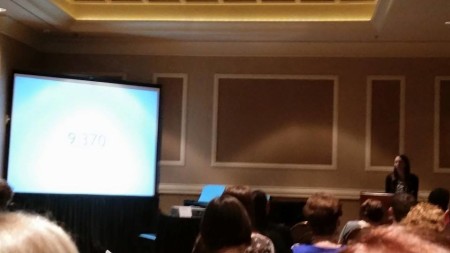
My own session began with a brief introduction to myself and my story (my blog and other projects). Then, I discussed the power of the internet, demonstrating how the internet has changed the world around us includiing marketing, communicating, and interacting within our field. I mentioned here that it is my opinion that the advent of large internet forums and communities online such as the Art of Piano Pedagogy facebook group are rapidly changing the face of piano teaching.
The second half of my talk was dedicated to discussing HOW musicians can harness the power of the internet, for whatever shared cause or common interest. First, I established the fact that nearly everyone is a blogger nowadays, through whatever your preferred platform: facebook posts, Twitter, Instagram, etc.. I shared various practical tips and principles to keep in mind while using the internet to engage others and build a community. For example:
- “Be genuine.”
- “Be generous.”
- “Tell stories.”
For me, it was an exciting honor to have the opportunity to present for an organization that I so deeply support.
3:30–4:30pm: The Art Of Balance: Managing And Finding Joy In Your Professional Music Career, by Jani Parsons.
Jani’s presentation was full of personal and practical insight into making a living and enjoyable career as a freelance musician. We musicians tend to wear many hats and finding balance is not always as easy task. Among her many wonderful suggestions, she spoke to balancing what we need to do to make a living and what we need to do be happy as artists.
After Pedagogy Saturday, I drove back to my friend’s home where I was staying as a guest. After dinner, I gave a masterclass for a number of her elementary-level students and a couple intermediate students. It was a lot of fun to engage her students and their parents in a conversation about a few principles of expressive music making.
That concluded the first day of the 2015 MTNA conference!
Index:


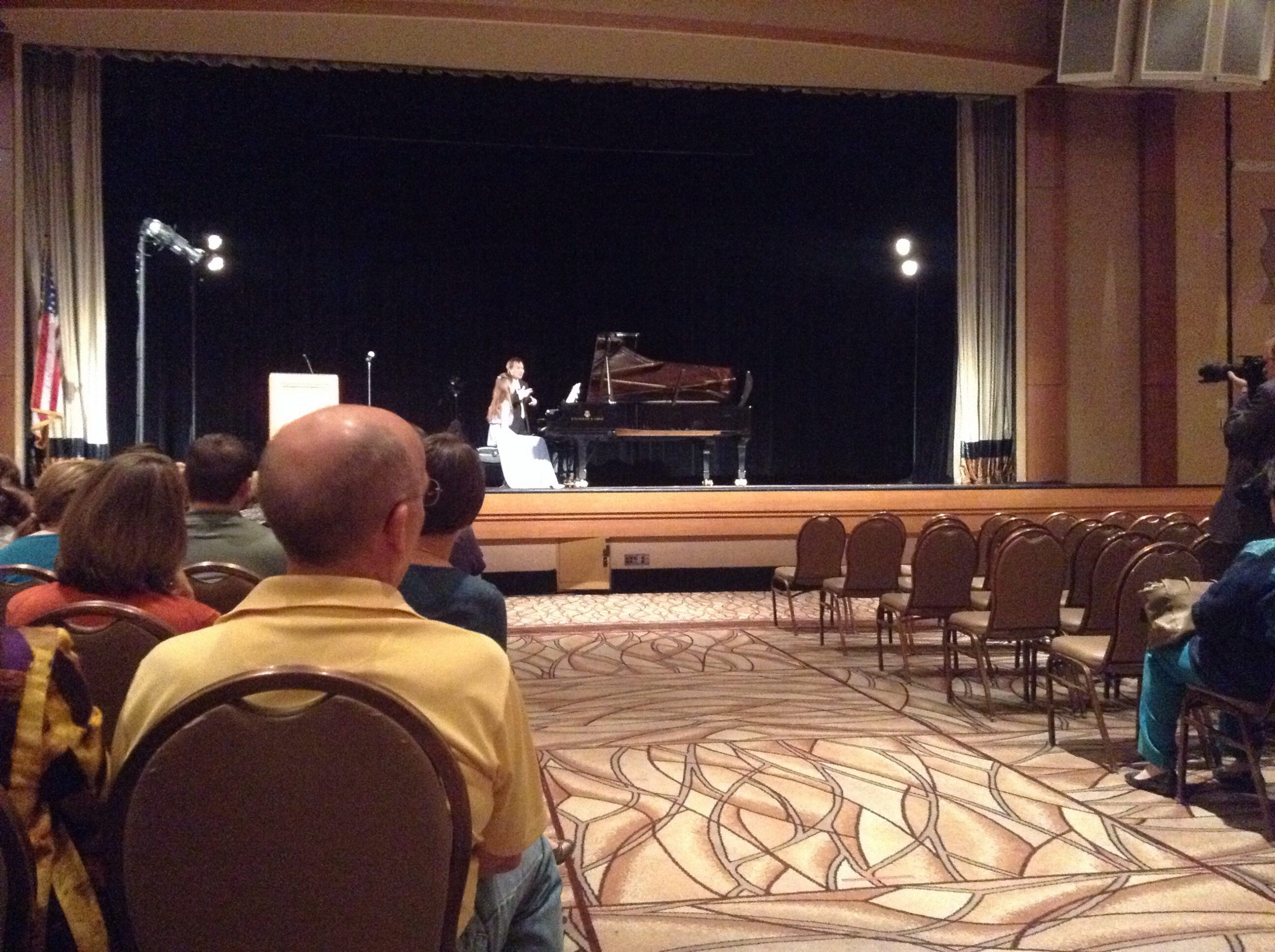
Thanks for the shout-out! I didn’t realize that you had attended a class on how to teach masterclasses the same day… No wonder you were so inspirational! 😉
The Russian School class sounds interesting. Honestly, when I think of first lessons, I don’t immediately think of grandeur or other dramatic expressions. But it sounds really cool for the student!
Yes, it was so great to have those masterclass ideas from Michael Benson’s session fresh in my mind while I taught your students, Kirstie! 😉
Thks for great post summarising 1st day at MTNA. I especially liked exploring Russian School and the student engaging in sound from the 1st lesson. I was embarrassing old on the bench before I realised I was to listen also when I played. Habits are formed early.
Glad you enjoyed reading my notes, Sarah! I agree, there is much we can learn from the Russian School about how we teach our beginners.